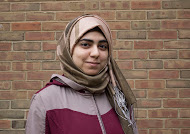Goshen College, if you haven’t noticed already, is not a particularly large campus. So, inevitably, many faces on Goshen’s campus become familiar. Most likely, many are already familiar with the face of Sara Azzuni, a first-year nursing student with a concentration in biochemistry.
One way you might recognize Sara Azzuni is due to her recent recognition in this year’s Kick-Off as the ‘audience favorite’ by her powerful reading of “Shades of Anger” by Rafeef Ziadah. The poem is Ziadah’s reflections on her identity as a Palestinian woman, even though she has been unable to spend any time in Palestine at all due to the dangerous climate of that region.Azzuni, who is originally from Palestine, has a similar story. As a Jordanian citizen who grew up in Dubai, having to leave her home due to the Israeli-Palestinian conflict has had a major impact on her family’s, as well as her own, identity.
“The conflict brought me to understand what’s happening around me in the world,” she said. “As a kid, I grew up hearing about the war in my homeland. I am seeking for peace there more than any other person.”
Raising awareness of the Israeli-Palestinian conflict at Goshen is something that is very important to her because of the shared importance of Jerusalem as a holy place for Islam, Judaism and Christianity. She said that the best way to get involved is to be informed about the conflict.
“Knowing what is going on in the Promised land is a good start,” Azzuni said when asked how interested and concerned students should get involved. “Educate yourself; have an opinion.”
One tangible, upcoming way to get involved is to support efforts and events on campus devoted to the cause, like the February 17 convocation on servant leadership opportunities and challenges.
There is nothing more essential to making change in the world than knowing what is going on outside the United States, Azzuni said, but she gave one cautionary piece of advice: don’t always rely on popular media.
“The media, sorry to say it, sucks,” she said. Because of America’s continued funding of Israel, the oppressor of Palestine, it follows that the media may be biased when reporting the facts of the conflict from a fair perspective.
Another way you might recognize Sara is by her headscarf—and believe me, she knows this. As the only Muslim on campus who wears a headscarf, she knows that people recognize her based on her appearance. More than just the general friendliness in which Goshen prides itself with, in the first few weeks, suddenly people she didn’t know on campus would be able to greet her by name.
“It was funny when someone I never met before would greet me with my name,” she said, laughing. “Out of curiosity, I would be, like, ‘Besides my name, what else do you know about me?’ It was nice; I became friends with a lot of people this way.”
Her appearance may have drawn eyes during the first few weeks of being on campus, but she is glad that now people are getting to know her for more than what she wears, what with her involvement in Kick-Off and her presence on campus as a voice for Palestinians.
Sara still remains open to anyone who may still have questions about her.
“If you are curious about me, my culture, my religion or even my favorite color, just stop me in the hallway and ask me. I will be more than happy to answer,” she said.
Something you may not know about Sara is how much she loves Goshen.
On September 17, 2015, Sara submitted an article to the Record about the difficulties of being an international student.
From food to language and everything in between, being an international student presents many more struggles and challenges than a normal experience of adjusting to college life.
But even then, Sara was facing those challenges head on. “I have started facing the struggles,” she wrote. “Once they put me down, and now I put them down instead.”
Originally, Sara wished for a Muslim community that spoke her language and understood her culture, which may be a familiar feeling for many Goshen students who have gone on SST and found themselves missing home.
Looking back on her first semester and how her attitude and experience at Goshen has changed over the past six months, Sara is thankful for the environment at Goshen. Besides the slight downside of an absence of good Middle Eastern restaurants, she lists conversation, culture, food, friendships, helpful teachers and interactive classes as important parts of her time in the United States.
“Being at Goshen in particular helped me,” she says. “People here let me be myself, see myself and present myself as I am.”



